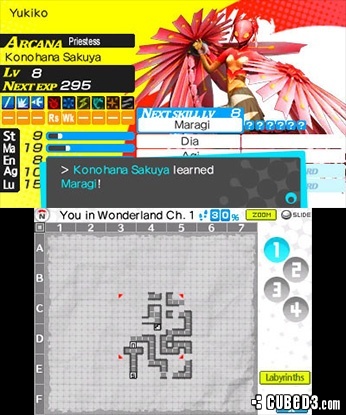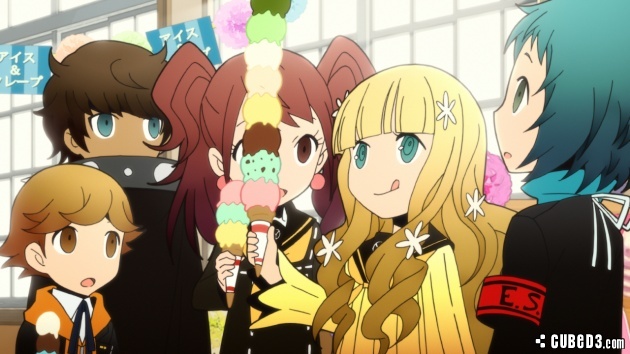Persona Q: Shadow of the Labyrinth (Nintendo 3DS) Review
By Drew Hurley  11.12.2014
11.12.2014

Atlus' Persona series' popularity boomed with Persona 3, and then positively exploded with Persona 4. Now there are three spin-off titles hitting platforms lately, each in very different genres. This latest is a first-person dungeon crawler with the cast of both, but can it live up to what came before? Cubed3 reviews Persona Q: Shadow of the Labyrinth on Nintendo 3DS.
Persona Q is a crossover title between Persona 3 and Persona 4 with gameplay elements from Atlus' Etrian Odyssey series. The story sets the cast of both games stuck in an alternative version of Inaba High School from Persona 4, where a mysterious clock tower has appeared on the grounds. The faculty and students have been replaced with mindless NPCs and strange portals into Labyrinths have appeared. It's up to the two casts to work together, along with a mysterious pair of characters - Rei and Zen - to figure out this latest mystery.
The game starts by letting the player choose if they want the story to centre around the cast of Persona 3 or Persona 4. The underlying Labyrinths don't change as the cast quickly meet up, and much of the storylines remain the same each playthrough, but are still unique enough to make both playthroughs worthwhile.
The story is much lighter than the classic Persona stories; it's filled with humour and has much fewer dark or serious moments. This would at first seem a negative. Certainly the serious and deep storylines are a very popular aspect of the series, however, this game is more a love letter to the fans, bringing in the best comedy the series has to offer and pairing it with some of the best dialogue the series has seen, especially in the encounters between the two casts.

Persona Q keeps many of the franchise mainstays, including one of the most popular features, the Pokémon-esque collecting of all the different Personas. It gets highly addictive. Personas can drop from different mobs, and they can be levelled up by being equipped, learning new skills as they gain experience. Most importantly, they can be combined to create new Personas. There are over 100 to fuse and create, with some outlandish, original and superb designs; completionists will find themselves trying to get every possible one to fill in their Persona Compendium.
Anyone familiar with the Etrian Odyssey series of games will find a lot of similarities with the Labyrinths in this title. Persona Q is a first-person dungeon crawler, instead of the previous third-person RPGs Persona is known for. Also, unlike Persona 3 and Persona 4, there are no enemy sprites wandering the map - they are replaced with random encounters. The only mob sprites wandering are the enemies known as F.O.Es. These are another aspect of the Etrian Odyssey series - mini-bosses that are much more powerful than the regular enemies. They roam the dungeons and each behaves differently; they may just move along set paths and can be avoided, or they could actively pursue the player, making a move after each player move. These F.O.E battles are very tough and it's worth waiting until much later in the game to try and take them on - the rewards for defeating them make it well worth the hard fight, with rare materials to create some powerful equipment, and some even drop some rare and powerful endgame Personas.
When hitting the random encounters it's classic Persona series combat, though now the whole party gets commands assigned, as opposed to individually. Persona Q has all attacks falling under one of two styles: physical or magical.
Magical abilities come in seven different elements: Bufu (Ice), Agi (Fire), Garu (Wind), Zio (Electricity), Megido (Almighty), Hama (Light) and Mudo (Dark). These can then level up to more powerful versions (e.g. Agi > Agilao > Agidyne), and some will upgrade to hit all enemies (e.g. Maragi > Maragion > Maragidyne). As with most RPGs, using these abilities consumes SP. Physical abilities and physical attacks come in different styles, too. Regular attacks are based on the user's weapon, whether piercing, blunt or slashing. The twist in Persona is that physical special abilities take HP instead of SP, meaning balancing when to use the physical abilities is key; there's always a risk of taking too much damage while dishing it out.

Each of the enemies has weaknesses and strengths. Hitting a weakness once will remember it for all future encounters and result in a "boost" bonus state for that character; if a character is in a boost state then they will attack before the enemy. Physical and magical attacks will have no HP or SP cost, and if the majority of characters are in a boost state at the end of a turn the signature "All Out Attack" takes place, where the entire party smashes into all of the enemies for big damage.
Along with the classic Persona combat system, there are some new additions. For example, like in Final Fantasy titles the game adopts the ability of organising the party in two rows, with the ranged attackers at the back and melee at the front in either a two/three or three/two setup, depending on the party composition.
The other addition to the battle gameplay is that the usual setup of the protagonist being the only character with the ability to use multiple Personas while the party members are stuck with a set single Persona is replaced with every character having their primary Persona from their respective game that cannot be changed, but now each character can also be equipped with a secondary or sub Persona. This allows for some very varied team setups and customisation, and works very well.
The two casts mean a bigger party is needed, allowing up to five characters from a pool of the entire casts of Persona 3 and Persona 4, along with the pair of Rei and Zen as a single character in the party. Many players will likely want to focus on levelling a core five characters as their primary party, but it is well worth levelling them all. There are a number of side-quests later in the game that require certain characters in the party within the Labyrinth, and most importantly the banter between the characters is fantastic! That alone makes it worth experimenting with different party setups to hear how the characters interact with each other.
There are five Labyrinths in total to explore, and each has unique gimmicks and enemies to face, whether it is more aggressive F.O.E enemies, or floors that can drain the party SP. Joining the party through these Labyrinths is Rise or Fuuka, reprising their roles as the navigators from the previous titles. They act as NPC narrators of the battles who can comment on enemies' abilities and weak points, while also being equipped with unique abilities to help out the party.

Persona Q has a fantastic use of the touch screen during the dungeon crawling. It is used to draw the maps of each of the Labyrinths, using a number of icons for the special aspects of the Labyrinth, such as two-way shortcuts and areas where special items can be collected, along with lines and coloured squares to outline walls and floors.
It is a feature that becomes quickly addictive. Each of the levels of a Labyrinth reward a fully-explored stage to incentivise it, but the reward is unnecessary as the mapping quickly becomes strangely fun. For those that can't see the appeal of map drawing as they explore, the game also offers the ability for it to be done automatically.
This game style, along with the stellar writing backed up by the solid performances from the voice acting cast, plus the always great soundtrack, make this another great addition to the series. That's not to say there aren't downsides to the game - Persona Q keeps one of the most frustrating aspects of the Persona series, which could put many players off. The random encounters can, in a perfect storm, result in an instant Game Over, with nothing the player can do about it. The party could be on full health and ready, but if there's a surprise encounter where the enemies just happen to hit first and hit the party weak points immediately, it can result in being wiped out before one can even make a move. It is a rarity, but worth remembering and saving often to avoid it being too painful.
Persona Q also does away with the series' famous Social Link system - a type of rep grind with various characters, each with individual stories, which is a high point for many fans. Considering where the game is set, it makes sense for this to be absent, but it's a pity; the day-to-day time management and friendship building between the dungeon crawling added a lot of charm and individuality.
Finally, there are also an awful lot of in-jokes and references to Persona 3 and Persona 4, so people new to the franchise may miss out and not enjoy this game quite as much. Atlus has clearly aimed this directly at their fans and their core audience.

Cubed3 Rating
Great - Silver Award

While Persona Q: Shadow of the Labyrinth is very much aimed at a core audience and may alienate potential newcomers, the fans are going to adore it. It keeps many aspects the series is famous for, while expanding a new and fun story with a ton of fan service. For fans of Persona it's a must-buy, and for those new to the genre it's worth a shot - even without getting all the in-jokes there's still a great game here.

![]() 8/10
8/10
![]() 0
(0 Votes)
0
(0 Votes)
 Out now
Out now  Out now
Out now  Out now
Out now  Out now
Out now Comments
Comments are currently disabled

 Sign In
Sign In Game Details
Game Details Subscribe to this topic
Subscribe to this topic Features
Features





 Top
Top

